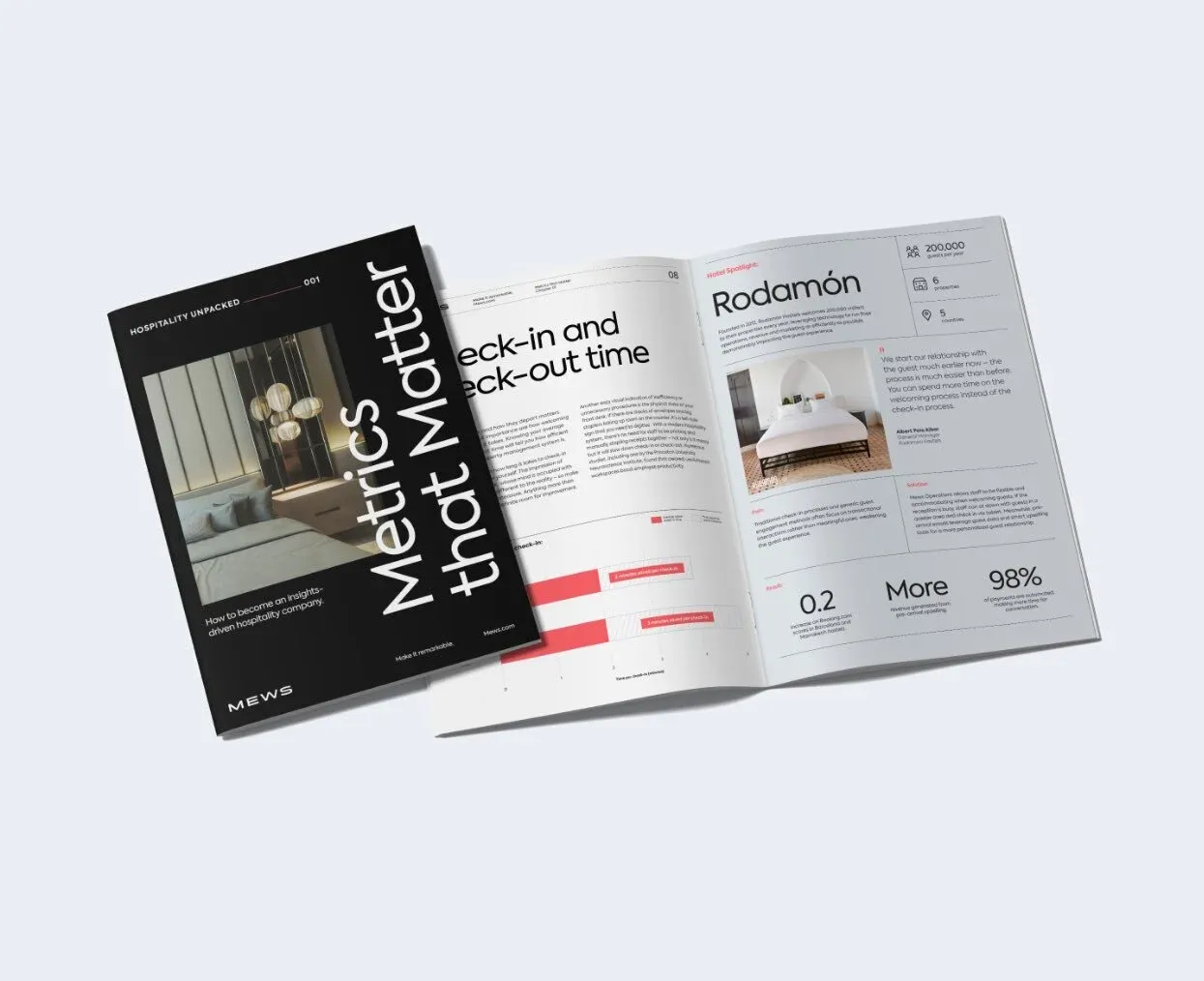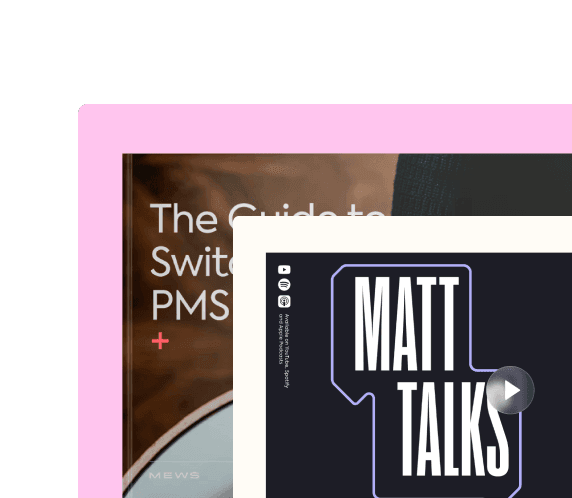Hotel business intelligence (BI) is essential for making informed, data-driven decisions. In the hospitality industry, understanding guest preferences, booking trends, occupancy patterns, and operational performance is key to optimizing revenue, improving the guest experience, and running your hotel efficiently.
This guide breaks down what hotel business intelligence is, how it works, the benefits, and how to choose the right solution for your property.
What is hotel business intelligence?
Business intelligence refers to tools and processes that collect, analyze, and visualize data to support operational and strategic decision-making. For hotels, BI connects multiple data sources, such as revenue management systems (RMS), property management systems (PMS), booking engines, marketing platforms, and point of sale systems (POS), to provide a complete view of hotel performance.
By analyzing historical and real-time data sets, hoteliers and hotel management teams can identify trends, anticipate demand, and adjust operations and pricing to drive revenue and guest satisfaction.

Benefits of business intelligence for hotels
There are many benefits of using BI tools to make strategic decisions based on real-time data.
Revenue management
BI tools help optimize pricing strategies through dynamic pricing. By evaluating occupancy trends, seasonal demand, competitor rates, and historical performance, hotels can set the right price for each room, maximizing average daily rate (ADR) and revenue per available room (RevPAR).
Forecasting capabilities allow revenue managers to anticipate demand fluctuations and plan promotions or upsells, helping increase total revenue without overbooking or underpricing.
Marketing and guest segmentation
Business intelligence helps identify the most profitable guest segments. By analyzing booking sources, channel performance, and guest profiles, hotels can target campaigns more effectively and encourage direct bookings. Insights from BI make it easier to tailor offers, upsells, and communications for different market segments.
Guest experience
Business intelligence provides insights into guest preferences and operational bottlenecks. Data from check-ins, guest surveys, and service usage can highlight opportunities for guest experience personalization, such as preferred room types, dining habits, or amenity preferences.
Integration with AI tools can summarize guest preferences for staff, helping teams deliver a more personal, memorable experience. Identifying recurring issues early also allows hoteliers to address hotel performance problems before they impact guest satisfaction.
Operational efficiency
BI tools help plan staffing and housekeeping based on predicted occupancy rates and demand forecast. Inventory management, maintenance scheduling, and service planning can all be informed by real-time data, improving operational efficiency and ensuring smooth operations.
Staff can focus on meaningful guest interactions while automated workflows manage routine tasks, similar to how cloud-based PMS systems streamline front desk and F&B operations.
Competitive analysis
Monitoring competitor pricing, market demand, and occupancy trends is another advantage. BI tools help hotels respond quickly to market shifts, optimize rates across channels, and adjust promotions to remain competitive with their comp set.
How hotel business intelligence software works
Data collection
Business intelligence starts with data collection across the property and market:
- Internal data: PMS, RMS, POS, booking engines, guest feedback.
- Market data: Competitor pricing, OTA performance, seasonal trends.
- Guest data: Preferences, past behavior, loyalty program activity.
A modern cloud-based PMS for revenue managers, like Mews, centralizes this hotel performance data in real time, allowing managers to make fast, informed decisions without switching between multiple systems.
Data analysis
After collecting the data, BI helps uncover trends, patterns, and actionable insights. Analysis might include booking pace, revenue trends, ADR, guest satisfaction scores, or F&B performance metrics.
Visualization and reporting
Dashboards and KPIs turn your raw data into understandable visualizations. Regular reporting helps teams track performance, monitor targets, and make decisions that improve revenue, guest satisfaction, and operational efficiency.

How to pick the right hotel business intelligence tool
Choosing the right business intelligence (BI) tool starts with knowing what you want to achieve. Define your hotel's goals first, whether it's optimizing revenue, improving guest experience, or streamlining operations, and set clear, measurable KPIs to track progress.
Choose tools that:
- Integrate easily with your existing PMS, POS, and other hotel systems
- Provide real-time insights and automated reporting
- Are intuitive for diverse teams to use
- Offer scalability as your hotel grows
Leveraging Mews for hotel business intelligence
Mews Analytics centralizes your hotel data, providing dashboards, automated reporting, and integration with Power BI, all within the same PMS interface.
Teams can upload up to three years of historical data, including targets and forecasts, and easily compare month-on-month or year-on-year performance. This centralized approach allows managers to make data-driven decisions across revenue management, guest experience, staffing, and operational efficiency.
What hoteliers can achieve with business intelligence
Hoteliers using business intelligence can:
- Adjust pricing dynamically based on real-time demand
- Monitor guest satisfaction and enhance personalization
- Track booking trends and customer preferences
- Optimize staffing and operational workflows
- Identify potential issues before they affect performance
- Benchmark against competitors and adjust strategies
- Improve marketing campaigns with better guest segmentation
- Streamline processes like preventative maintenance
Conclusion
Hotel business intelligence turns data into actionable insights. By connecting operations, guest information, and market intelligence, business intelligence helps hotels make smarter decisions, improve revenue, elevate the guest experience, and optimize staff efficiency.
With the right BI tools, like Mews Analytics, hoteliers can monitor performance across departments, react to trends, and stay ahead of the competition, ensuring both profitability and high-quality service.
Want to know which definitive hospitality metrics you should be tracking?
Download our guide "The Metrics that Matter"

Written by

Jessica Freedman
Jessica is a trained journalist with over a decade of international experience in content and digital marketing in the tourism sector. Outside of work she enjoys pursuing her passions: food, travel, nature and yoga.










